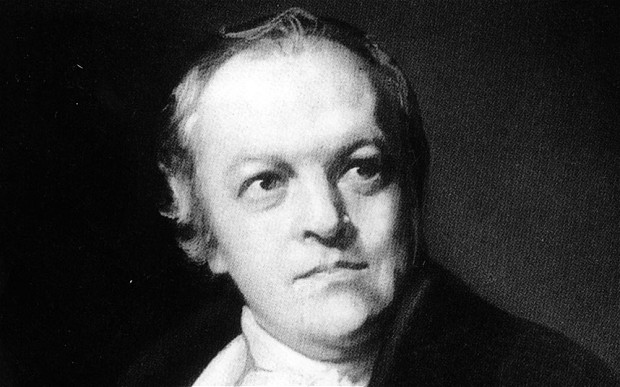
In the following letter William Blake addresses his friend and former patron William Haley. An eminent biographer whose Works of William Cowper foreshadowed modern historiography techniques, Haley made frequent use of Blake’s illustrations in his books (hence the reference to George Romney’s portrait). Blake attributed his artistic renaissance to Haley, who had, perhaps in recognition of his friend’s yet-hidden talent, provided him with a cottage on the seacoast of the village Felpham. It was in this pastoral setting that Blake believed himself to be rid of the “spectrous fiend,” the Spectre of de-humanizing Reason, that shadow of the vacuous self. Blake came to believe that a unified vision can only be had by the transformation of everyday reality through the Imagination, a loosening of the definitive structure binding man to his fallen state. In pursuit of such a vision Blake eventually broke contact with Haley; he was deeply hurt by his friend’s attempt to “tame” his fervent, if unconventional, spirituality. Haley was later immortalized in Blake’s couplet: “Thy friendship has made my heart to ache: / Do be my enemy for friendship’s sake.”
London, 23 October 1804
Dear Sir,
…I write immediately because you wish I should do so, to satisfy you that I have received your kind favour…The pleasure of seeing another poem from your hands has truly set me longing (my wife says I ought to have said us) with desire and curiosity.
…For now! O Glory! and O Delight! I have entirely reduced that spectrous Fiend to his station, whose annoyance has been the ruin of my labours for the last passed twenty years of my life. He is the enemy of conjugal love and is the Jupiter of the Greeks, an iron-hearted tyrant, the ruiner of ancient Greece. I speak with perfect confidence and certainty of the fact which has passed upon me. Nebuchadnezzar had seven times passed over him; I have had twenty; thank God I was not altogether a beast as he was; but I was a slave bound in a mill among beasts and devils; these beasts and these devils are now, together with myself, become children of light and liberty, and my feet and my wife’s feet are free from fetters. O lovely Felpham, parent of Immortal Friendship, to thee I am eternally indebted for my three years’ rest from perturbation and the strength I now enjoy.
Suddenly…I was again enlightened with the light I enjoyed in my youth, and which has for exactly twenty years been closed from me as by a door and by window-shutters. Consequently I can, with confidence, promise you ocular demonstration of my altered state on the plates I am now engraving after Romney, whose spiritual aid has not a little conduced to my restoration to the light of Art. O the distress I have undergone, and my poor wife with me: incessantly labouring and incessantly spoiling what I had done well. Every one of my friends was astonished at my faults, and could not assign a reason; they knew my industry and abstinence from every pleasure for the sake of study, and yet—and yet—and yet there wanted the proofs of industry in my works. I thank God with entire confidence that it shall be so no longer—he is become my servant who domineered over me, he is even as a brother who was my enemy. Dear Sir, excuse my enthusiasm or rather madness, for I am really drunk with intellectual vision whenever I take a pencil or graver into my hand, even as I used to be in my youth, and as I have not been for twenty dark, but very profitable years. I thank God that I courageously pursued my course through darkness. In a short time I shall make my assertion good that I am become suddenly as I was at first, by producing the Head of Romney and the Shipwreck quite another thing from what you or I ever expected them to be. In short, I am now satisfied and proud of my work, which I have not been for the above long period…
I remain, with my wife’s joint affection,
Your sincere and obliged servant,
Will Blake
From Letters of William Blake. Edited by Geoffrey Keynes. Cambridge: Harvard University Press, 1970. pp. 105-7.
FURTHER READING
William Blake’s engravings for Haley: http://www.blakearchive.org/exist/blake/archive/copy.xq?copyid=bb466.2&java=no
A brief biography of the poet and painter.
An essay on the importance of his engravings in reading his poetry.
Blake’s “Ghost of the Flea.”


